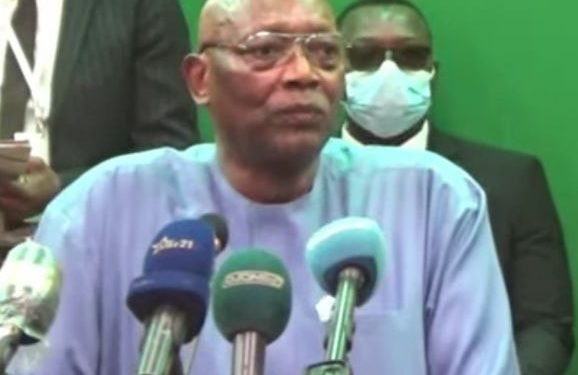The Speaker of Sierra Leone’s Parliament, Dr Abass Bundu, has expressed support for the Guinean people as they seek to return to democracy following the September 5 coup.
Bundu said Sierra Leone was in solidarity with its neighbor, which it shares not only common history but also common destiny.
He was speaking in the Guinean capital Conakry on Saturday, as a guest at the inauguration of the National Transition Council (NTC), the legislative arm of the transition government.
The NTC is the last of the four organs of the transition administration in Guinea as provided for in the transition charter unveiled by Junta leader and Transition President Col. Mamady Doumbouya last month.
Bundu was one of two high profile international dignitaries who graced the event which was presided over by Col. Doumbouya.
Also in attendance was the President of the NTC of Mali, Col. Malick Diaw and Guinea’s transition Prime Minister Mohamed Beavogui.
In his address, the Sierra Leonean Speaker described the occasion as “historic”, noting that it marked the “milestone on the journey to restoring our Sister Republic of Guinea to democratic governance.”
The inauguration ceremony, held at the People’s Palace, the home of Guinea’s parliament, coincides with the 5th anniversary of the coup which removed former president Alpha Conde from power.
The junta has been under pressure from the international community, particularly the West African bloc ECOWAS to hold election and transfer power to a civilian administration.
At their latest summit in the Ghanaian capital Accra on Thursday, February 3rd, ECOWAS leaders decided to maintain sanctions earlier imposed on the junta leadership and ordered the transition government to come up with a reasonable timeline for a return to power.
The 81-member NTC, as the parliament, is crucial in that it will decide on the date for all major activities leading to elections. It will also preside over the drafting of a new constitution, which is a pre-requisite for the elections.
According to Bundu, the close relation that their two countries share made it incumbent on Sierra Leoneans to express solidarity with Guineans in their current situation of need.
“What you are going through we have been through before…The next step we hope that will come from Guinea is the definition of a clear timetable, a timetable that will culminate in the establishment of a democratic system of governance,” he said.
He added: “We are confident you will succeed in that path. It is with that confidence I have come to express our solidarity on behalf of the people and parliament of Sierra Leone.”
Bundu also appealed to Guineans to make good use of the opportunity to attain the ultimate goal of a return to democratic rule, warning that the journey wouldn’t be easy and that it would require every Guinean’s courage and determination.
“It is not an easy task, but it is the task that the people of Guinea most uphold. And you can count on the republic of Sierra Leone, the government, and people of Sierra Leone and indeed the parliament of Sierra Leone to be with you along that process.”






















